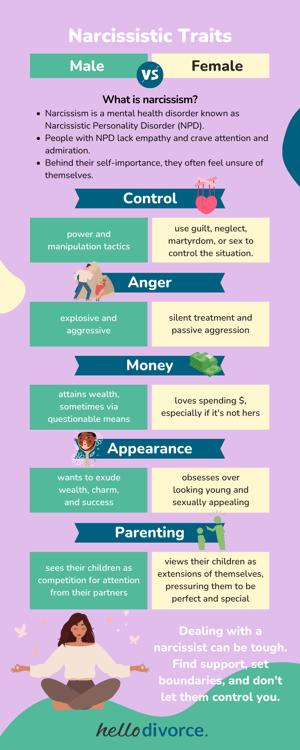Narcissist Traits: Male vs. Female

Although narcissism has gotten much attention over the past few years, Narcissistic Personality Disorder (NPD) is one of the least-studied personality disorders, and there is still much about it that social science doesn't know. What some studies have found, however, is that men and women often express narcissistic traits very differently from each other.
What is narcissism?
We use the term narcissism loosely in conversation today, but clinical NPD is a true mental health disorder defined by the Diagnostic and Statistical Manual of Mental Disorders, or DSM-V.
People who suffer from narcissist personality disorder have little empathy for others. They appear self-consumed and have a constant need for attention and admiration.
But behind this mask of self-importance, people with NPD are usually unsure of themselves and their self-worth. While clinicians don’t know exactly what causes NPD, they speculate that a combination of genetics and upbringing could lead to the narcissist’s lack of healthy development.
People who haven’t been clinically diagnosed with NPD can still exhibit many narcissistic traits. Whether they truly have the disorder or not is for a licensed mental health practitioner to decide. Still, you may find it interesting to learn the research: Men tend to exhibit narcissistic traits more than women, and certain narcissistic traits can be more prevalent depending on sex.
Male vs. female narcissist traits
Because men and women are socialized differently, there are some differences in their general personality traits. The same holds true for male and female narcissists.
For instance, studies have shown that male narcissists are generally more likely to have a lack of empathy for others than females. Female narcissists usually are more envious of others than their male counterparts.
There are other ways males and females express their narcissistic traits differently. Here are some signs of narcissism to be aware of.
Control
When trying to get and keep control over others, narcissistic men often resort to power and manipulation tactics, whereas women tend to use guilt, neglect, martyrdom, or sex to control the situation.
Anger
Male narcissists are typically more aggressive and explosive when they’re angry. Female narcissists tend to act out with more passive aggression, often withholding love and attention.
Money
Because money equals status, it plays heavily into a narcissist’s need to be special. But men tend to focus more on attaining money (often through any means necessary) to boost their self-esteem, whereas women may focus more on spending it, especially if it belongs to someone else
Appearance
While male narcissists tend to focus on exuding an appearance of wealth, charm, and success, female narcissists may obsess over looking perpetually young and sexually appealing.
Fidelity
Both men and women narcissists demand unrivaled attention from their romantic partners. If they feel they aren’t getting that, they will look elsewhere.
Whereas narcissistic husbands often put little effort into these affairs and can often be serial adulterers, narcissistic wives can be more cunning in their pursuit of extramarital affairs, trapping the object of their desire and then holding them with threats.
Parenting
For female narcissists, their children become an extension of themselves and their need for admiration. They put the same type of pressure on their children to be special and perfect that they do themselves. They often show favoritism between children – which can lead to low self-esteem for one or more of the kids – and they may manipulate the children against the other.
Male narcissists, on the other hand, tend to view their children as their own competition when it comes to getting attention from their partners.
More research is needed to better understand the lack of empathy and caring exhibited by most narcissists and the unhealthy effect it can have on relationships and society as a whole.
Narcissism in a romantic relationship
Being in a relationship with a narcissist comes with some highly unique challenges. First of all, most people with NPD never get diagnosed. That leaves a lot of unsuspecting people out there who will inadvertently get involved with someone who is self-serving and uncaring.
Narcissistic relationships can become co-dependent and difficult to maintain in a healthy way. If you believe you are with a narcissistic partner or spouse, it’s important to understand what you’re dealing with and how to handle the terrain.
You may have been attracted to your spouse because of their intense charm and successful persona. But the person you are in a relationship with now may be very different from the one who initially attracted you. Due to their own insecurities, they may crave excessive admiration, have an outrageous sense of entitlement, and exude other behaviors that harm their loved ones (including you!) instead of helping them.
It’s not your fault
You are not the problem. Although your spouse may want you to feel otherwise, you deserve respect and consideration in your relationship.
Here are some more suggestions for dealing with a narcissistic romantic partner.
Set clear boundaries
Decide what behavior you’re willing to put up with in your relationship and what is unacceptable. Then, decide what the consequences would be if your spouse were to cross into the no-zone.
While sharing these boundaries with your spouse would be essential in a healthy relationship, realize that a narcissistic spouse may turn the conversation on you or disregard you completely.
Don’t internalize their comments
Many comments made by spouses with narcissistic traits are meant to get a reaction or manipulate. Their insults and criticism have little to do with you and everything to do with them.
If you start to believe what they say, it can destroy your self-confidence and resolve. Learn how to advocate for yourself instead of being their doormat.
Don’t accuse
Accusing a narcissistic spouse will just trigger more of their anger and manipulation. When discussing issues with your spouse, try to stay calm. Frame the discussion from your own viewpoint, using “I” comments instead of accusatory “you” comments.
Avoid blaming and belittling
When dealing with a narcissistic spouse, you may be tempted to fight fire with fire. This can be self-defeating in the end. They can hurl insults and criticism without remorse, but you will probably feel guilty for your behavior, and that can keep you sympathetic and further accountable to your spouse.
Not all narcissism is directed outward. Covert narcissism also exists. Covert narcissists tend to internalize their negative feelings about themselves. However, their behavior in a romantic relationship can be just as damaging.
Get support
When dealing with a narcissistic spouse, you may begin to question what is normal and what isn’t. You need a strong support system to provide you with validation and keep you on even ground. This may be a support group of spouses of narcissists, trusted friends, or the professional help of a therapist.
Regardless of whom you work with, you need people who can help you keep sight of where normal behavior ends and bad behavior – manipulation tactics and other narcissistic abuse – beings.
Living with a narcissist can be difficult. You may have the desire to move on through divorce so you can reclaim your sense of self. But divorcing a narcissist can feel insurmountable.
If you are considering a divorce from a narcissistic spouse, Hello Divorce is here to help. We offer divorce plans and many other services that can help you disentangle yourself from a manipulative marriage into a new and bright future. Schedule a free phone call to see how we can help.
.png)
Ready to re-discover yourself with coaching or therapy?
Our FREE checklist can help you find the right fit.
Download our checklist of questions to ask a potential therapist or coach today.
Suggested: How to Divorce a Narcissist and Win




